#jean luc nancy
Explore tagged Tumblr posts
Text
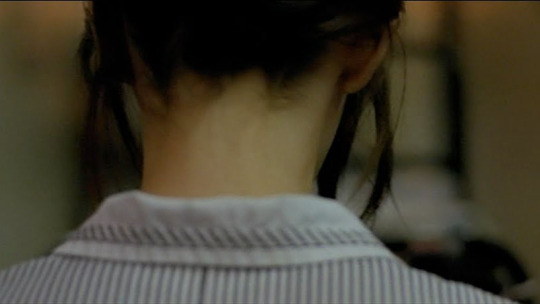
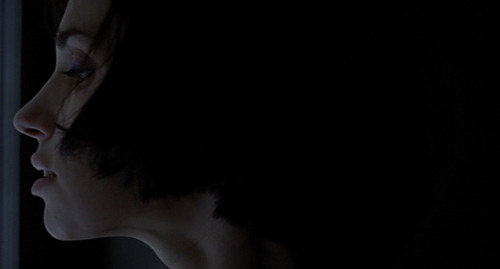
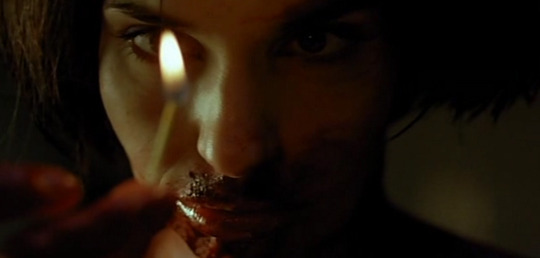
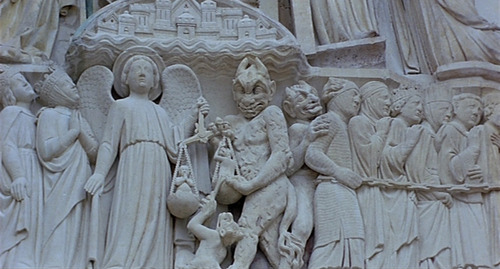
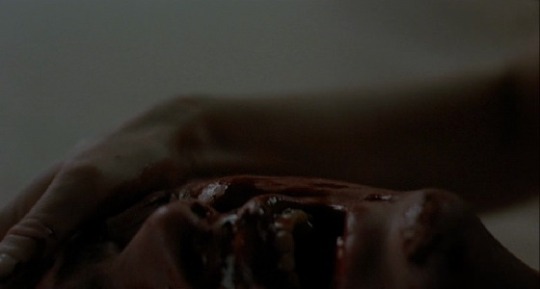
There’s possibly no other living director as in sync with the politics of touch as Claire Denis. […]
And while Trouble Every Day operates, superbly, as a biological-themed horror film, it would cheapen director Claire Denis’s achievement to say that she merely literalizes the violent implications of sex, even when manifested as traditional “romantic” lovemaking. Films have been linking sex with violence since their inception and, frankly, it’s not a particularly surprising conclusion with which to arrive. Denis, however, expounds on the notion of sex-as-violence with an unnerving clarity that appears to explain why acts of theoretical love and brutality assume such disconcertingly similar outward appearances, as both involve attempts to foster illusions of control where there aren’t any. Theoretically, sex involves a search for communion, intimacy, whereas violence is often an expression of dominance, and Denis shows that intimacy and dominance are similarly impossible concepts to realize with any degree of permanency, if we’re to be truthful with ourselves. […]
FULL
Trouble Every Day [Claire Denis 2011]
#CLAIRE DENIS#trouble every day#great directors#great cinematography#tindersticks#jean pol fargeau#jean luc nancy#agnes godard#Vincent Gallo#film#cinema#movies#french film#nicolas duvauchelle#alex descas#cannibal love#philosophy
33 notes
·
View notes
Text
In francese si dice “sage comme une image”, tranquillo come un’immagine: ma la tranquillità dell’immagine non è solo moderazione, è anche la tensione di uno slancio, che si dà e si offre a una presa. La seduzione delle immagini, il loro erotismo non è altro che la loro disponibilità ad essere prese, toccate cogli occhi, con le mani, col cuore o con la ragione, e penetrate. Se la carne ha avuto un ruolo esemplare nella pittura, è perché ne è lo spirito, molto al di là della figurazione della nudità. Ma penetrare l’immagine, così come il corpo di un (‘) amante, vuol dire essere penetrati da esso. Lo sguardo si impregna di colore, l’orecchio si impregna di sonorità. Nella mente non c’è niente che non sia nei sensi: nell’idea non c’è niente che non sia nell’immagine. Io divento il blu del ritratto di Olga, io divento la dissonanza di un accordo, un passo di danza. “Io”: non è più questione di io. Cogito diventa imago.
Jean-Luc Nancy
7 notes
·
View notes
Text
"Cuando peno o resoplo, cuando digiero o sufro, me caigo o salto, duermo o canto, me conozco ser únicamente eso que pena o que canta, que gesticula o que se rasca: eso, y no aquel, o al menos no como un ego distinto de cualquier otra cosa. Eso, pues, a manera de aquel, o aquel que no es más que eso"
Jean - Luc Nancy, 58 indicios sobre el cuerpo
0 notes
Text
"Libido is presented as the violence that breaks the limits of the body through torn flesh and blood, turning everything into surface. The medium of the body and that of the film itself are broken, representation itself fails and the invisible flickers at the edge of sanity. As Jean-Luc Nancy writes, body and screen become interchangeable, as the Real takes form"
Aspasia Stephanou, Inhuman Materiality in Gothic Media
0 notes
Text









The Intruder (Claire Denis, 2004).
38 notes
·
View notes
Text
Il ne s'agit pas d'être là, il s'agit d'être le là.
JEAN-LUC NANCY
7 notes
·
View notes
Text
Touch at a distance may very well be the essence of touch, writes Jean-Luc Nancy.
7 notes
·
View notes
Text



#Jean-Luc Nancy#its own remote flowered void#strange new kind of inbetween thing#you don't know my attributes
8 notes
·
View notes
Text
Cualquier imagen, cuando estaba vivo [Jacques Derrida], lo afectaba con esa afección ruinosa. Cualquier imagen de él vivo le colocaba ante los ojos esa demasiado segura desaparición de lo que carece-de-imagen, de lo inimitable, de lo irrepresentable e insustituible que cada cual no sabe que es sino sabiendo al mismo tiempo que no puede verlo (o verse) ni tenerlo en modo alguno; y que no lo «es», por consiguiente, sino al modo de la huida.
—Jean-Luc Nancy, A título de más de uno. Jacques Derrida. Sobre un retrato de Valerio Adami. Traducción de Cristina Peretti y Cristina Rodríguez Marciel
#jean-luc nancy#a título de más de uno#à plus d'un titre#cristina peretti#cristina rodríguez marciel
5 notes
·
View notes
Text
sanctus dentes/canem dei
okay u know what –– I just answered an anon ask that brought up the old cori fic I talked about writing months ago, so in the spirit of recollection I was excavating some drafts and I found a part I like –– all that to say, here’s the first vignette of sanctus dentes / canem dei for your consumption :) this is the prologue to the whole kit and caboodle, and it’ll probably get edited and expanded before I post it in earnest, but I really truly haven’t posted writing in so long and today I'm on a good wave of productivity and hey, seize the moment ride the urge etc etc
a TW for gore, blood, violence, and body horror (which I'll also put in the post tags)
SANCTUS DENTES / CANEM DEI (draft, WIP)
EPIGRAPH
“Epopteia, completed sight––meaning the sight that brings us beyond initiation (which only ‘understands’) to ‘contemplation,’ a ‘super-sight’ that is a ‘devouring of the eyes’ (the eye devouring its very self), a grasping and finally a touching: the very absolute of touching, touching-the-other- as being-touched, each being absorbed and devoured in the other.” –– Corpus, Jean-Luc Nancy
GENESIS I: THE PARABLE OF THE DINING ROOM FLOOR
“You don’t love me.”
The blood bubbles in tongues between the split lips. The young man has the eyes of a doe, his pupils blown wide enough they swallow the tawny ring of his shivering iris. His terror is so thick from his pores it might be swiped up with a finger, swept against the tongue, tasted in all its viscous splendor. He reeks of panting sweat, the tar and velvet of post-arousal pheromones crashing into summer-lightning adrenaline that crackles in the nose.
The Corinthian hums into the plate of the sternum. He cradles the tender cheek, licks the soft skin of the purpling undereye, where the threads of capillaries have split beneath the epidermis. The taste is not iron –– such a banal simplification, to call blood near-spilling only, reductively, “metallic”. It’s a bouquet of honeysuckle plasma, fatty satin like good gruyere, platelets of sour rhubarb pie and fresh raspberry. When he bites the thin skin, it tears easily, only so much wet tissue under perfected incisors.
“I don’t?”
"You––" The tears season the meat well –– the Corinthian appreciates the gesture. "You said––"
"Baby," the Corinthian murmurs into the open wound, "didn't your momma ever tell you not to trust a stranger?"
Languorous and immovable, the Corinthian pins the young man's wrists above his bleeding head. In the dark, all things become more and less than what they are. The thick cords of the neck pull taut, strung fierce enough that their columns emerge from the dimness as the spine of some deep-sea horror cresting the sea. He scrapes his teeth against the jaw, where the bone runs close to the surface, and prophesies the sponge of marrow under molar. The body shudders –– glorious, isn't it, how the rigid little mind might strive to save itself from that which thrills the flesh.
"Please. Please."
"Little lamb, what're you begging for?" The Corinthian lays a kiss against the mouth. From the man's overlapping palms issues the hilt of a thin blade –– the other is buried, arrow-like, between his second and third rib. The rasp of the voice is laden with lung collapse, breath that no longer fits into smothered struts. In the valley of the tendons, the heart courses, torrential.
“Mercy. Merciful God, I can’t die like this.”
The Corinthian sinks his teeth into the muscle of the shoulder, at the point it meets the neck. A slobbery gasp surges from the open mouth –– no better music, thinks the Corinthian, as his canines meet the granite edge of the scapula. The heart is racing, ever the traitor. They are all like this. The space between suffering and ecstasy is so minute he could not slide a fingernail into it.
He severs, at last, the tendons, and a slop of meat comes free. The sheets of the hotel bed will be irrecoverable –– mark of a real good night. It's hot and fresh down his throat. He thinks about getting sashimi after he's done here. Though it'll be a long time until the meal has ended.
The man's mind is fading, even while his body yearns after the teeth that destroy it. He babbles, warbling prayers so loose-limbed and slurred they are only a horsehair bow drawn across untuned vocal folds.
"Father who art in Heaven, hallowed be thy name, hallowed be thy––"
"Shh, shh shh shh, baby." He chews and swallows, and when he kisses the hollow of the throat it's only to rip the skin loose from the clavicles, to see those nubs of bone glow pearlescent in the night. "Be not afraid."
"––thy king–– thy kingdom come–– thy––"
Once, when he was young, he had eaten only the eyes. He had popped the tart cherries of sight, reveled in the liquor of the vitreous humor, the plasticky chew of the cornea –– he'd gnaw on the lenses for hours, like wads of clear gum. But his life had been long, and his maker had sculpted him from famine, and famine knew no sating. Famine, blooming low in the gut, scaled the spine and hung from the jaw. It grew, and grew, and filled him with gaping mouths. There was no moment he did not hunger. He couldn't satisfy himself on eyes, these days.
"You fear what you don't understand," says the Corinthian. The man's arms are slack enough that when he releases them, they slump limb and immobile. He drags his hands down the flanks, sinks his fingers between two mirrored ribs, and the flesh gives so readily it seems almost eager. "I don't love you?"
With a squelch and groan, the intercostals split apart. The Corinthian curls his grip around the bone, on either side, and grins, threefold.
"––thy will be–– done–– on Earth, as it is–– in Heaven–– give–– give us––"
"Sanctum corpus," he breathes. "Baby, don't be cruel."
"––this day, our daily bread–– forgive–– forgive–– forgive––"
He snaps the ribs apart. The hull of skin and muscle is rent open, and the smell, sacramental wine, bursts forth in heavenly plenitude.
"Hoc est enim corpus meum. Eat of my flesh, and drink of my blood."
The man buckles, chokes. The whites of his eyes shine liquid, pale shells, spilled oil.
"I love you," murmurs the Corinthian. He does.
The Corinthian buries his face in the guts, and takes communion.
#tw: gore#tw: blood#tw: body horror#tw: bodily fluids#tw: violence#the sandman#the sandman fic#the corinthian#the corinthian (sandman)#jean-luc nancy's corpus is a massive influence on this btw#really cool book! highly recommend#anyway this'll be on ao3 at some point as well#after hounds 42 goes up#thanks for reading!#wip
49 notes
·
View notes
Text



Trouble Every Day [Claire Denis 2011]
#CLAIRE DENIS#trouble every day#béatrice dalle#tindersticks#great directors#jean pol fargeau#jean luc nancy#agnes godard#Vincent Gallo#film#cinema#movies#french film#nicolas duvauchelle#alex descas#cannibal love#philosophy#少女椿
26 notes
·
View notes
Text

Salvatore Quasimodo, Il mio paese è l’Italia
4 notes
·
View notes
Text
Des milliards d’images montent du vide sidéral ou numérique, sans composer de figure. Mais ces images ont la force sidérante du vide où elles se propagent. Cette force est démesurée. Elle nous traverse, elle nous disloque, elle nous défigure. Les images sont toujours la force de ce qui provient d’une profondeur insondable, de ce qui monte de l’abîme : mais voici qu’aujourd’hui elles ne configurent plus l’abîme d’où elles viennent, elles le font plutôt venir et elles exposent ceci, qu’elles sont sans fond. En ce sens, elles ne font plus, non plus, figure. Aussi ne peut-on plus dire que la connaissance soit toujours reconnaissance. Aujourd’hui, le savoir – jusqu’au plus savant des savoirs – a lieu sur une brèche, ou sur la crête d’une vague, et il est toujours aussi savoir de la brèche ou de la crête, et de l’imminence d’un non-savoir. Jean-Luc Nancy, La Pensée dérobée, Éditions Galilée, 2001
6 notes
·
View notes
Text
Episode 66: Riker's Stupid Faces
TNG: "The Arsenal of Freedom" and "Symbiosis"
There are skeevy salesmen everywhere this week on Star Trek: The Next Generation! First up, an automated pitchman is putting the crew in danger in “The Arsenal of Freedom”. After that, drug dealers posing as physicians have an entire planet in their thrall in “Symbiosis”.
Also this week: Grandma Root, a Wrath of Khan reunion, and ranting about Reagan.
Content warning: brief mention of Tasha’s rape gangs
Timestamps: synopses: 2:49; The Arsenal of Freedom: 11:27; Symbiosis: 31:51
#star trek#star trek podcast#podcast#the next generation#star trek tng#the arsenal of freedom#symbiosis#jean luc picard#william riker#data#worf#geordi la forge#deanna troi#beverly crusher#tasha yar#wesley crusher#good ship lollipop#merritt buttrick#say no to drugs#drug addiction#nancy reagan#ronald reagan#aids epidemic#SoundCloud
0 notes
Text
Efe Baştürk – Foucault’dan Rancière’e Gelecek Demokrasi (2023)
Bu kitap çağdaş felsefenin mimarları Foucault, Derrida, Agamben, Rancière ve Nancy’nin politik düşüncesinin izini sürüyor. Foucault’da delilik ve kapatılmadan Rancière’in ‘Cahil Hoca’sına, Derrida’da tekillik ve konukseverlikten Agamben’de dil ve sessizliğe uzanan bir yol izliyor. Bu kitaptaki ‘çağdaş’ düşünürlerin ortak problemi, polisin (kent devletinin) başlangıçtan beri idealize edilmiş…
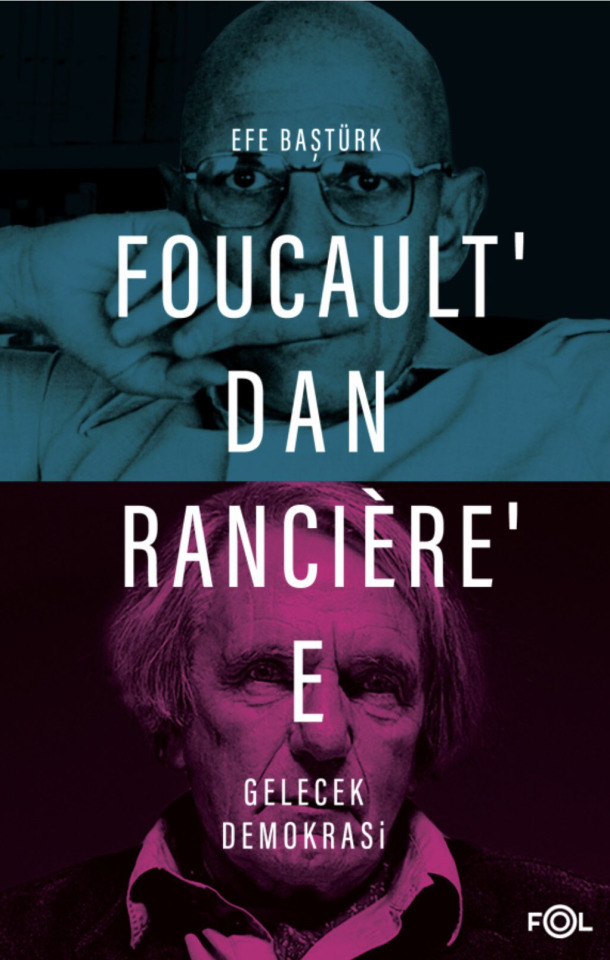
View On WordPress
#2023#Efe Baştürk#Fol Kitap#Foucault’dan Rancière’e Gelecek Demokrasi#Giorgio Agamben#Jacques Derrida#Jacques Rancière#Jean-Luc Nancy#Michel Foucault
0 notes
